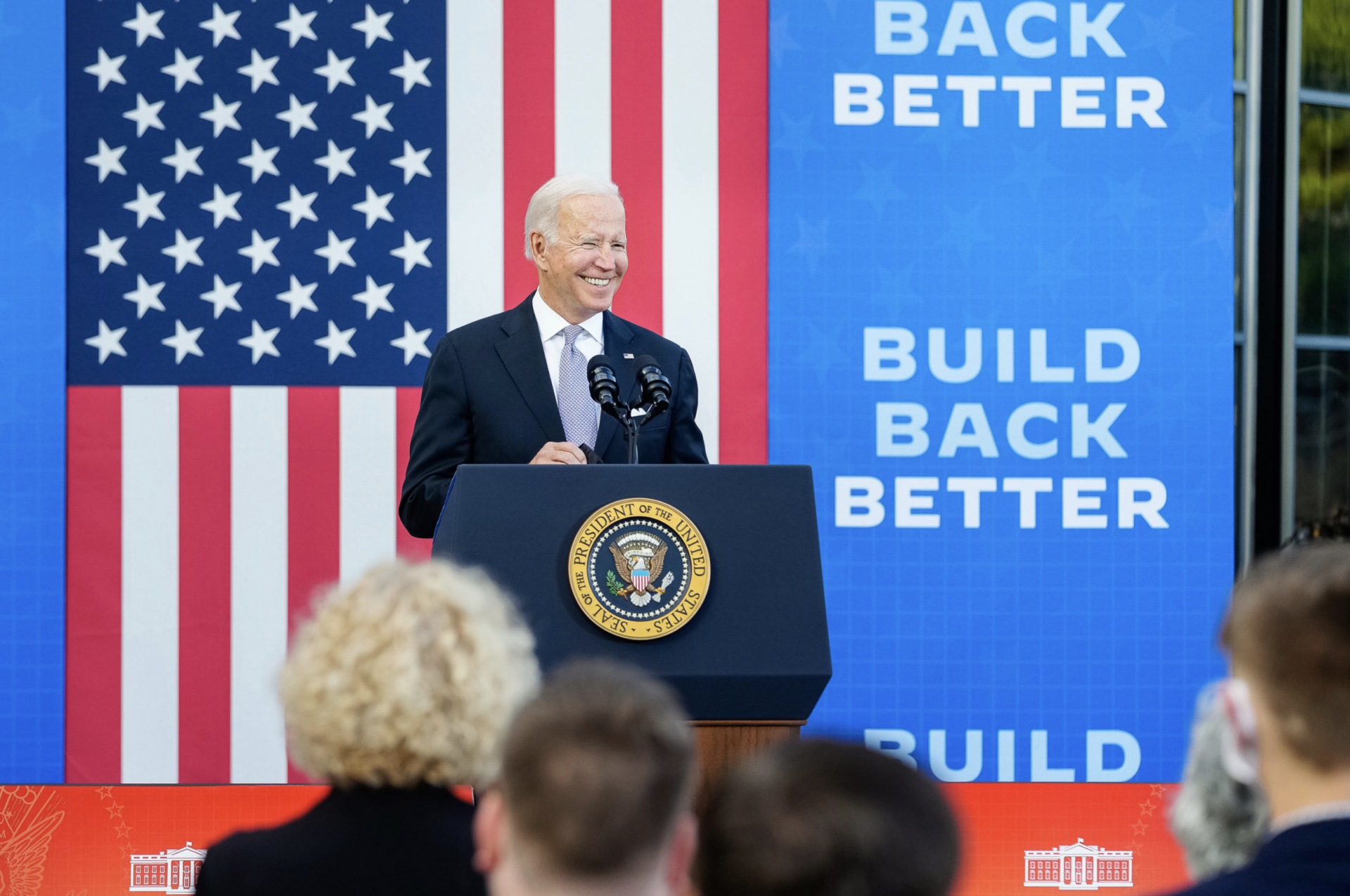
As a former Hill staffer, I must confess that I was pretty surprised by the scale and scope of American Jobs and Families Plans President Biden released last Spring. Congress had just passed the incredibly robust American Rescue Plan – a piece of legislation that would have been unthinkable during the first year of President Obama’s Administration. At the time, I worried that the President might trim his ambitions and whittle down his Build Back Better Agenda out of a concern that moderates might not support a second piece of ambitious legislation.
My initial fears were unfounded. Instead, Pres. Biden released a landmark proposal for major investments in universal child care, affordable housing, clean energy, and more.
Still, this was only his opening offer. I also knew from experience that bills on Capitol Hill don’t typically make it to the other side of the horse-trading and sausage-making of the legislative process unscathed. I understood that compromises would likely be made. In Washington, compromise is synonymous with “cuts” – either to programs, funding levels, or the likely duration of those programs. We’ve seen the consequences of congressional deal making as Sen. Manchin and Sen. Sinema force painful cuts to climate, free community college, affordable housing, and more. As of this writing, the President is eyeing an overall price tag running closer to $1.9 trillion.
But here’s the catch: the facts on the ground have changed since Biden released his agenda nearly six months ago. Today’s facts suggest we need an even more ambitious legislative agenda to meet the moment – not less. The $3.5 trillion reconciliation package, itself a compromise, combined with the Bipartisan Infrastructure Framework (BIF) should be the floor – the absolute minimum – Congress passes before the year is out. The proof is in the data: a new EPI study found that cutting the Build Back Better agenda to $1.5 trillion will result in 2 million fewer jobs supported each year, a major hit at a time when we are still 5 million jobs down since the start of the pandemic.
We can’t afford to let two Senators stymie our economic recovery or our once-in-a-generation opportunity to create a more resilient and equitable economy for our future. Here are five facts that make the economic case for more investment, not less:
-
Delta Surge: In March 2021, the highly-contagious Delta Variant completely upended any progress the United States was making in bringing down caseloads and deaths from COVID-19. Even with vaccines widely available, the second surge in caseloads brought a new wave of business losses, with over half of small businesses across the country facing permanent closures; a struggle to reopen schools and child care facilities safely; and a delay in returning to work for millions of people, whether due to inadequate pay or workplace protections or a lack of affordable child care.
-
Stalled Job Growth. Jobs growth slowed considerably in August and September, falling well below economists’ expectations. The weak August and September jobs reports, with only 235,000 and 194,000 jobs created, respectively, were the worst since January and served as a harsh reminder that the coronavirus is still a formidable threat to our daily lives and the health of the overall economy. And despite the decrease in unemployment nationally, recent data from major metro areas showed persistent double-digit unemployment rates for Black workers in nine of the largest cities around the country.
-
Child Care Crisis. Fueled by the pandemic, lack of affordability, worker shortages, and decades of disinvestment, the child care crisis is keeping many parents, especially women, from returning to their jobs or finding work. Compounding the child care crisis is a growing shortage of child care workers, many of whom left the underpaid and undervalued industry in search of better pay and safer working conditions. This crisis has contributed to what many are calling a “She-Session” — from February 2020 to May 2020, 11.5 million women lost their jobs compared to 9 million men. Millions of women dropped out of the labor force completely last month; in fact, more women left the workforce in September than the economy added jobs.
-
Skyrocketing Housing Costs. The Supreme Court’s decision to strike down the eviction moratorium put at least 2 million people in danger of losing their homes. At the same time, compared to March 2020, the cost of a median one-bedroom rent nationally is up 10.7 percent and two-bedroom rents are up even more at 13.1 percent. Soaring rental costs are having an outsized impact on low-income families, who spend roughly 8 percent more on housing costs than the average household, as well as Black and Latinx families, who are more likely to be renters across all income levels. Given that one-third of households making less than $50,000 a year lost the entirety of their financial savings during the pandemic, addressing the housing crisis is critical to any real economic recovery.
-
Racial Inequality. While aggregate unemployment has fallen to 4.8 percent from its pandemic high of 14.8 percent in April 2020, Black unemployment remains at crisis levels of 7.9 percent, and Hispanic and Latinx workers face persistently high unemployment of 6.3 percent. While the Black unemployment rate dropped last month, this was more likely the result of Black workers exiting the labor force entirely. Black and brown communities have always paid the price for our deeply unequal economy. Cutting back investment now would leave them behind once again.
These facts on the ground discredit any suggestion that our current path to economic recovery is sufficient. Rather, they underscore what’s at stake and who will pay the price if we allow arbitrary budget cuts and needless delays to win the day.
Underfunded, means-tested, half-measures won’t meet the needs of families facing the threat of eviction; help parents choose between their jobs or caring for their children or a sick family member; or help us avert a climate disaster. If Democrats want to avoid repeating the mistakes of the Great Recession, which only locked in a prolonged and unequal recovery, they must commit to passing the full, unabridged Build Back Better Agenda.
October 27th, 2021 – Article updated
Lindsay Owens, Ph.D.
Lindsay Owens is the Executive Director of the Groundwork Collaborative. Lindsay has worked in academia, government, and the non-profit sector for nearly 15 years. Most recently, she served as a senior economic policy adviser to Senator Elizabeth Warren and as deputy chief of staff and legislative director to Reps. Keith Ellison and Progressive Caucus Chair Pramila Jayapal. In these roles, Lindsay was instrumental in crafting and passing legislation to expand the social safety net, increase power for workers, and build a more inclusive economy for all. She has also served as a policy adviser to candidates for state, local, and national office, including several presidential campaigns.
Lindsay is a highly-cited sociologist with deep expertise in economic inequality, poverty, housing policy, and recessions. Her work is published in leading social science journals including Brookings Papers on Economic Activity, The Annals of the American Academy of Political and Social Science, and Social Forces. Her award-winning dissertation examined the federal policy response to the housing crash of the Great Recession. She teaches a popular undergraduate course on poverty and inequality at Georgetown University and is the co-creator and co-instructor of America’s Poverty Course online at Stanford University.
Lindsay is a frequent author of opinion editorials and white papers. Her recent writing and policy proposals have appeared in outlets including The New York Times, The Boston Globe, Newsweek, CNN.com, and The San Jose Mercury News. Lindsay holds a Ph.D. and Master’s degree in sociology from Stanford University and a Bachelor’s degree from the University of Pennsylvania. She currently resides in the Capitol Hill neighborhood of Washington, D.C., with her partner Jay.







